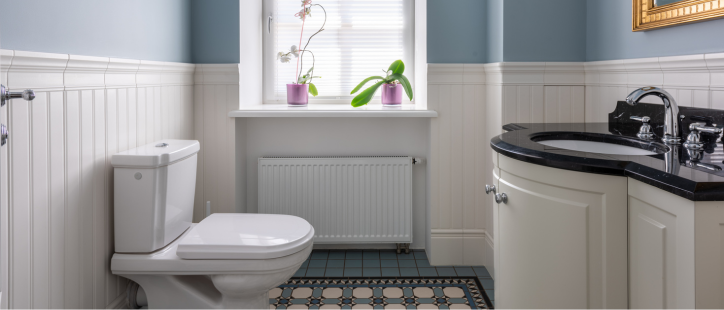Plumbing problems are an inevitable part of homeownership. Whether you live in an older house or a brand-new one, you’ll likely encounter common plumbing issues at some point. While these problems can be inconvenient and sometimes costly, understanding and preventing common home plumbing problems can save you time, money, and stress. We’ll explore some of the most common plumbing issues homeowners across Massachusetts’ North Shore like you face and offer tips on how to prevent and address them.
Leaky Faucets and Fixtures
Leaky faucets and fixtures are among the most prevalent plumbing issues homeowners encounter. The constant dripping not only wastes water but also leads to increased water bills over time.
Causes:
- Worn-out or damaged seals, O-rings, or washers
- Corroded valve seats
- High water pressure
- Improper installation
Prevention:
- Regularly maintain and replace faucet components
- Install water-saving aerators
- Address high water pressure with a pressure regulator
Clogged Drains
Clogged drains are another common plumbing woe that can disrupt your daily routines. Whether it’s a slow-draining sink or a completely blocked shower drain, clogs are a nuisance.
Causes:
- Accumulated hair, soap scum, and debris
- Grease and food particles in kitchen sinks
- Foreign objects flushed down toilets
- Tree roots invading sewer lines
Prevention:
- Use drain strainers to catch debris
- Avoid pouring grease down kitchen sinks
- Dispose of food scraps properly
- Schedule routine drain cleaning and inspections
Running Toilets
A running toilet is not only irritating but also a significant water waster. It can result in a substantial increase in your water bill if left unaddressed.
Causes:
- A faulty flapper or flush valve
- A loose or damaged fill valve
- Sediment buildup in the tank
- Incorrect water level settings
Prevention:
- Regularly inspect and replace toilet components
- Adjust water level settings to the correct level
- Consider installing a dual-flush system
Low Water Pressure
Low water pressure can hinder various household tasks, from showering to washing dishes. Identifying and addressing the root cause is essential to restore proper water flow.
Causes:
- Mineral buildup in pipes and fixtures
- Leaks or clogs in water supply lines
- Faulty pressure regulator
- Municipal water supply issues
Prevention:
- Periodically flush your water heater
- Install a water softener if you have hard water
- Regularly inspect and maintain plumbing pipes
Water Heater Problems
Your water heater is an essential appliance, and when it malfunctions, it can disrupt your daily routine. Common issues include no hot water, insufficient hot water, and leaks.
Causes:
- Sediment buildup in the tank
- Faulty heating elements or thermocouples
- Corroded or damaged tank
- Improperly sized or installed unit
Prevention:
- Flush your water heater regularly
- Schedule professional maintenance
- Replace an aging water heater before it fails
Pipe Leaks
Pipe leaks can cause significant water damage to your home and lead to costly repairs. Identifying and addressing leaks promptly is crucial.
Causes:
- Corrosion due to aging pipes
- Freeze-thaw cycles in cold climates
- High water pressure
- Accidental damage during renovations
Prevention:
- Regularly inspect pipes for signs of corrosion or damage
- Address high water pressure with a pressure regulator
- Insulate pipes in cold climates
- Take care when drilling or nailing near pipes
Sewer Line Backups
A sewer line backup can be a messy and unpleasant ordeal. It can result in sewage backing up into your home or yard, posing health risks and requiring immediate attention.
Causes:
- Tree roots invading sewer pipes
- Accumulated grease, debris, or foreign objects
- Structural damage to the sewer line
- A collapsed or misaligned pipe
Prevention:
- Schedule regular sewer line inspections
- Avoid planting trees near sewer lines
- Dispose of grease and food scraps properly
- Educate household members about what can be flushed
Frozen Pipes
In cold climates, frozen pipes can lead to bursts and significant water damage. Preventive measures are crucial to protect your plumbing in the winter.
Causes:
- Exposure to freezing temperatures
- Lack of insulation around pipes
- Inadequate heating in crawl spaces or basements
Prevention:
- Insulate pipes in unheated areas
- Allow faucets to drip during extreme cold
- Maintain consistent indoor heating
- Seal gaps and cracks that allow cold air in
Garbage Disposal Issues
Garbage disposals can become jammed or clogged when misused, causing inconvenience in the kitchen.
Causes:
- Putting non-food items or hard objects down the disposal
- Overloading the disposal with food scraps
- Lack of regular cleaning and maintenance
Prevention:
- Avoid putting non-food items in the disposal
- Dispose of food scraps in small batches
- Run cold water while using the disposal
- Regularly clean and maintain the unit
Gas Line Leaks
Gas line leaks are a serious safety hazard. If you smell gas in your home or suspect a gas leak, take immediate action.
Causes:
- Corroded or damaged gas lines
- Loose fittings or connections
- Faulty appliances or gas valves
Prevention:
- Schedule regular gas line inspections
- Replace old or damaged gas lines
- Install gas detectors in your home
- Educate household members about gas safety
Understanding and Preventing Common Home Plumbing Problems is One Call Away
Common plumbing issues can disrupt your daily life and lead to costly repairs if left unattended. By understanding the causes of these problems and taking preventive measures, you can maintain a well-functioning plumbing system and reduce the likelihood of plumbing emergencies. Regular maintenance, inspections, and prompt repairs are key to keeping your home’s plumbing in top condition and avoiding the stress and expenses associated with plumbing issues. The experts at Maffei Services are here to help – one call handles it all!



